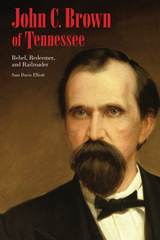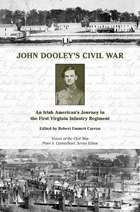4 start with J start with J

John Calvin Brown was a Confederate general, Tennessee politician, railroad executive, and lawyer, and yet he is little known to today’s Americans. He left behind few personal papers and died relatively young despite his remarkably productive life, leaving his voice silent while historical debate raged over events in which he was a significant player.
John C. Brown of Tennessee is the first full-scale biography of this understudied figure. Author Sam Davis Elliott’s comprehensive research reveals how Brown rose to the rank of general in the Confederate Army of Tennessee. A five-time wounded veteran of nearly every one of the army’s battles from Fort Donelson to Franklin, Brown played a unique utility role as a division commander in the 1864 Atlanta Campaign. There is a substantial likelihood he was an early leader of the Ku Klux Klan after the war, but more well-established is his role as leader in the anti-Brownlow movement that sought to end Radical Reconstruction in Tennessee. He was selected president of the 1870 constitutional convention, which helped lead to his election as governor later that year. After his tumultuous time as governor seeking to resolve economic conflicts that began before the Civil War, he became a railroad executive and industrialist. He had a significant role in the struggle between rival financiers for control of the southern route to the Pacific, and was in the front lines of management on behalf of the Texas and Pacific Railroad during the Great Southwest Railroad Strike of 1886. His wide-ranging and successful career reflects not only the attributes of Brown’s character, but provides insight into many key events of nineteenth-century America.
John C. Brown of Tennessee fills not only a biographical but a historiographical gap in the literature on the Civil War and Reconstruction in Tennessee and the post-Confederate South.


Among the finer soldier-diarists of the Civil War, John Edward Dooley first came to the attention of readers when an edition of his wartime journal, edited by Joseph Durkin, was published in 1945. That book, John Dooley, Confederate Soldier, became a widely used resource for historians, who frequently tapped Dooley’s vivid accounts of Second Bull Run, Antietam, and Gettysburg, where he was wounded during Pickett’s Charge and subsequently captured.
As it happens, the 1945 edition is actually a much-truncated version of Dooley’s original journal that fails to capture the full scope of his wartime experience—the oscillating rhythm of life on the campaign trail, in camp, in Union prisons, and on parole. Nor does it recognize how Dooley, the son of a successful Irish-born Richmond businessman, used his reminiscences as a testament to the Lost Cause. John Dooley’s Civil War gives us, for the first time, a comprehensive version of Dooley’s “war notes,” which editor Robert Emmett Curran has reassembled from seven different manuscripts and meticulously annotated. The notes were created as diaries that recorded Dooley’s service as an officer in the famed First Virginia Regiment along with his twenty months as a prisoner of war. After the war, they were expanded and recast years later as Dooley, then studying for the Catholic priesthood, reflected on the war and its aftermath. As Curran points out, Dooley’s reworking of his writings was shaped in large part by his ethnic heritage and the connections he drew between the aspirations of the Irish and those of the white South.
In addition to the war notes, the book includes a prewar essay that Dooley wrote in defense of secession and an extended poem he penned in 1870 on what he perceived as the evils of Reconstruction. The result is a remarkable picture not only of how one articulate southerner endured the hardships of war and imprisonment, but also of how he positioned his own experience within the tragic myth of valor, sacrifice, and crushed dreams of independence that former Confederates fashioned in the postwar era.

Josiah Gorgas was best known as the highly regarded Chief of Confederate Ordnance. Born in 1818, he attended West Point, served in the U.S. Army, and later, after marrying Amelia Gayle, daughter of a former Alabama governor, joined the Confederacy. After the Civil War he served as president of The University of Alabama until ill health forced him to resign. His journals, maintained between 1857 and 1878, reflect the family's economic successes and failures, detail the course of the South through the Civil War, and describe the ordeal of Reconstruction. Few journals cover such a sweep of history. An added dimension is the view of Victorian family life as Gorgas explored his feelings about aspects of parental responsibility and transmission of values to children--a rarely documented account from the male perspective. His son, called Willie in the journals, was William Crawford Gorgas (1854-1920), who was noted for his fight to control yellow fever and who became surgeon general of the United States.
In his foreword to the volume, Frank E. Vandiver states: "Wiggins has done much more than present a well-edited version of Gorgas's diaries and journals; she has interpreted them in full Gorgas family context and in perspective of the times they cover. . . . Wiggins informs with the sort of editorial notes expected of a careful scholar, but she enlightens with wide knowledge of American and southern history. . . . Josiah Gorgas [was] an unusually observant, passionate man, a 'galvanized Rebel' who deserves rank among the true geniuses of American logistics."
READERS
Browse our collection.
PUBLISHERS
See BiblioVault's publisher services.
STUDENT SERVICES
Files for college accessibility offices.
UChicago Accessibility Resources
home | accessibility | search | about | contact us
BiblioVault ® 2001 - 2024
The University of Chicago Press









